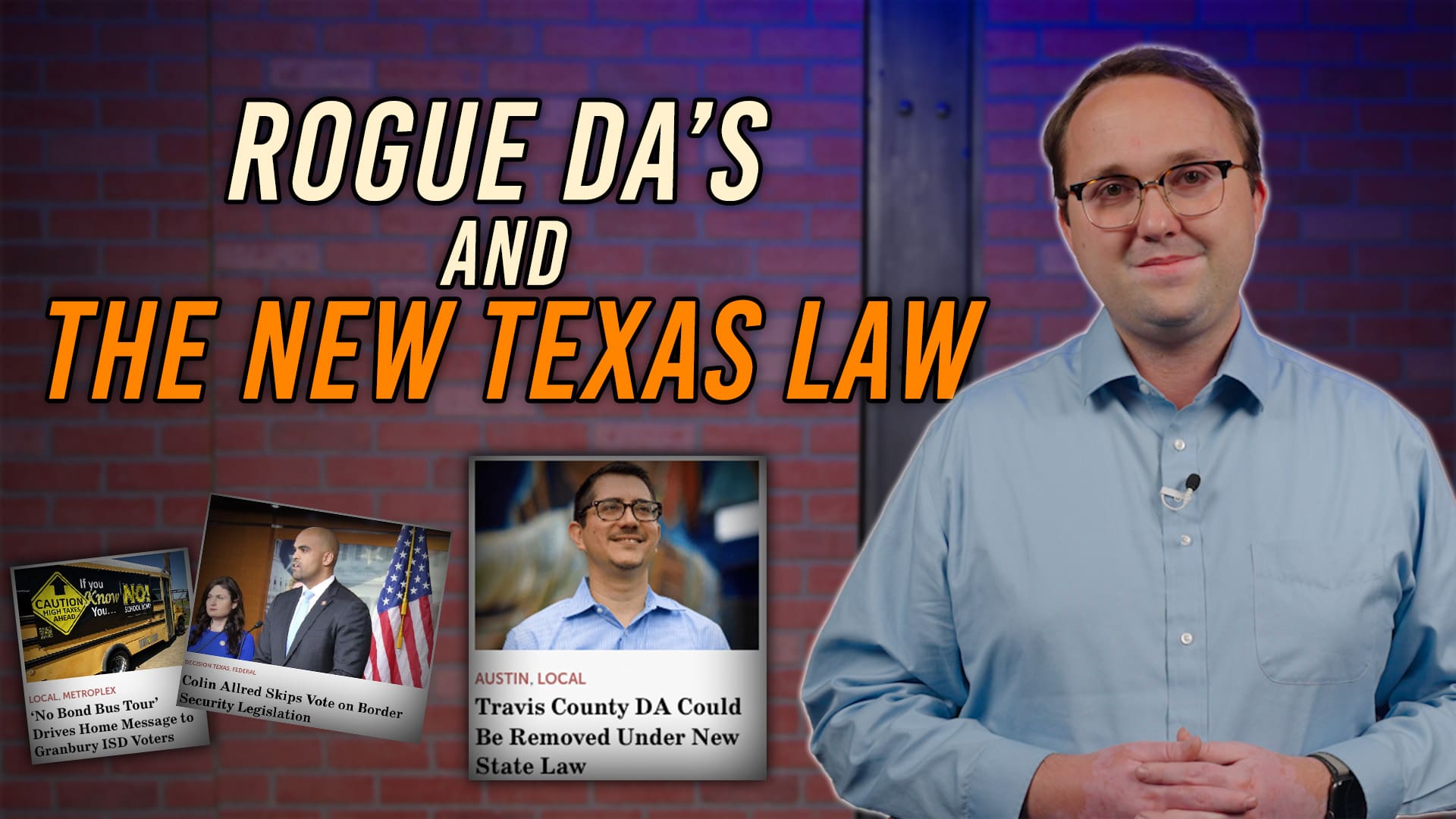Both the Texas House Committee on the Judiciary & Civil Jurisprudence and the Senate State Affairs Committee recently heard legislation that would assist in ensuring local district attorneys follow state law.
Last summer, five Texas DAs—Jose Garza (Travis County), John Creuzot (Dallas County), Joe Gonzales (Bexar County), Mark Gonzalez (Nueces County), and Brian Middleton (Fort Bend County)—announced their refusal to prosecute illegal abortions.
This was not the first time local district attorneys hand-selected which crimes to punish. In 2019, Creuzot announced he would not prosecute some “low-level” and nonviolent crimes.
House Bill 200 by State Rep. Jeff Leach (R–Plano) is a legislative priority for House Speaker Dade Phelan (R–Beaumont) and would re-establish the Prosecuting Attorneys Coordinating Council.
The Prosecuting Attorneys Coordinating Council was a state agency from 1977 to 1985 that was responsible for delivering assistance, professional development, education, and training to Texas prosecutors as well as investigating complaints regarding incompetence or misconduct by prosecutors.
HB 200 would re-establish the council “with a singular purpose to accept and investigate complaints alleging incompetence or misconduct by elected prosecutors across the state,” according to Leach.
The council will receive complaints from the public and choose to begin an investigation or not. [The] council would have the ability to resolve those complaints by public and private finding or recommend [a] reprimand or filing a petition for removal, which would go for a special judge appointed by the Supreme Court.
Jennifer Szimanski, director of public affairs for the Combined Law Enforcement Association of Texas (CLEAT), spoke in favor of HB 200, stating, “Many of our members and their families have been negatively impacted by rogue district attorneys who have engaged in malicious prosecution, failed to prosecute suspects who have harmed officers, and outright refuse to prosecute crimes including felony offenses at all levels.”
“These district attorneys have undermined the will of the Legislature and are destroying law enforcement agencies across our state,” said Szimanski. “They’ve created an environment in which public safety is in jeopardy and criminals are free to victimize members of our community.”
Rebecca Parma, legislative director for Texas Right to Life, also testified in support of HB 200 and raised the pro-life issue, “District attorneys across the country, including several in our great state, have made public statements declaring their intent not to fully enforce our pro-life laws. While district attorneys rightly have discretion over whether to prosecute case by case, they do not have the authority to adopt sweeping policies subverting the lawmaking authority of the Legislature.”
Two district attorneys spoke against the bill. Galveston County District Attorney Jack Roady said that the State Bar grievance process and the removal statute in state law “are both very robust,” while Smith County District Attorney Jacob Putnam said, “I don’t think this bill will accomplish what everyone hopes it will accomplish. With all due respect, it creates a bureaucracy—a bureaucracy that was previously sunsetted for being inefficient and not accomplishing it.”
Putnam argued that elections serve as the ultimate check on elected officials. He also claimed that creating another avenue for complaints won’t serve to check only rouge DAs, because as prosecutors “make a lot of people mad.”
It is a part of our job. Defendants’ families get mad when I prosecute them. Victims’ families get mad when I don’t. It happens every day.
Nick Hudson of the American Civil Liberties Union of Texas raised concerns about the lack of definition for a prosecutor’s “official duties” and a provision in HB 200 that “disqualifies county attorneys and district attorneys while a removal complaint is still pending.”
It would create opportunities for the state to effectively take over the administration of an entire county and their criminal prosecutions without proving that removal is actually warranted in court.
HB 200 was left pending in committee on Wednesday.
The Senate heard testimony on Senate Bill 20 by State Sen. Joan Huffman (R–Houston) Thursday.
“Certain Texas prosecutors have joined a trend of adopting internal policies refusing to prosecute particular laws,” said Huffman. “These actions set a dangerous precedent and severely undermine the authority of the Legislature.”
SB 20 would bar “prosecuting attorneys from materially limiting or prohibiting the enforcement of any criminal offense, whether that be by adopting and enforcing policy or by demonstrating by pattern or practice.”
Additionally, the measure prohibits a prosecutor from preventing peace officers from enforcing a criminal offense. Any prosecutor violating this provision would be subject to the state’s removal process.
CLEAT’s Szimanski also spoke in favor of SB 20, focusing on how the measure could help Travis County due to “the George Soros-funded DA who has played a role in the destruction of the Austin Police Department.”
A DA who ran a campaign on prosecuting cops and letting criminals roam free is our reality. And he’s living up to his promise, as he has indicated.
In Travis County, we have a district attorney who entered into a standing order or an agreement with the district judges. The order was filed in district court to release suspects prior to magistration on certain charges. They have determined they will not prosecute across the board.
Andrew Hendrickson of the American Civil Liberties Union of Texas testified against SB 20, saying, “We believe the voters should decide whether prosecutors’ policies are effective by the elections.”
SB 20 was left pending in committee.
The 88th Legislative Session ends May 29.





